Japan-China Relations
Visit to China by Mrs. Akie Abe, the Spouse of the Prime Minister of Japan
1. November 9
(1) Meeting with former JET/JDSs
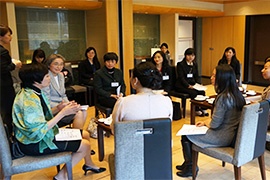
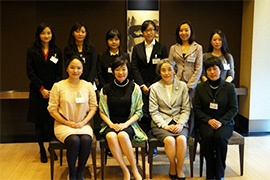
(2) Dinner with women in Beijing
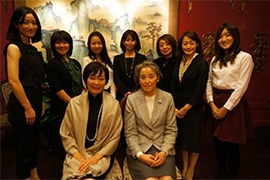
2. November 10
(1) APEC official event organized by China Disabled Persons' Federation
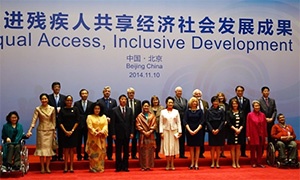
Mrs. Akie Abe attended APEC official event organized by China Disabled Persons' Federation. She was welcomed by Mrs. Peng Liyuan, the spouse of the President of the People's Republic of China, joined a group photo with other leaders' spouses.
Mrs. Peng Liyuan and the head of China Disabled Persons' Federation guided the spouses to visit an exhibition of art works of Chinese people with disabilities, then to see the disabled people's talent show. After joining another family photo, Mrs. Abe attended the APEC theme meeting of "promoting of people with disabilities to share the fruits of economic and social development."
(2) Meeting with former JENESYS2.0 members
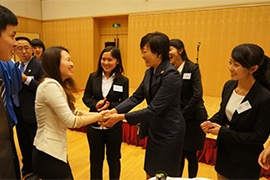

In the Embassy of Japan in Beijing, Mrs. Akie Abe met with about 65 youngsters who formerly visited Japan by JENESYS2.0 programme. During the event, Mrs. Abe joined each table to talk with all the participants. The meeting was held in friendly and warm atmosphere and she enjoyed listening to the members of their fortunate encounters and impression from Japan.
Mrs. Abe said to the participants "Please speak to your friends in China frankly on what you have felt through your visit to Japan. I hope you will be a linking bridge between Japan and China for the future."
(3) Visit to the Japan Foundation (Japanese cultural centre) in Beijing
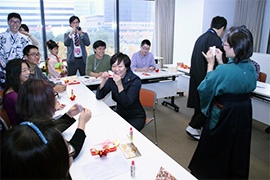
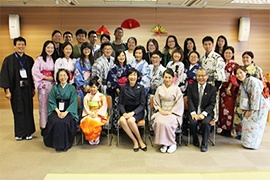
Mrs. Akie Abe visited the Japan Foundation (Japanese cultural centre) in Beijing. The director of the institute welcomed her and explained about their efforts. Mrs. Abe observed its cultural lessons of Japanese Shogi game, Origami (art of folding papers) and the way to wear Yukata (a kind of Kimono) respectively.
Mrs. Akie Abe expressed the gratitude to Mr. Li Minsheng, the lecturer of Shogi, who started introducing Japanese Shogi game in China in 1990s for his contribution for promoting Japanese culture and encouraged the students who are learning Shogi in the centre. She also enjoyed making Origami with Chinese youngsters.
3. November 11
(1) Visit to the Summer Palace / Luncheon hosted by Mrs. Peng Liyuang, the spouse of the President of the People's Republic of China
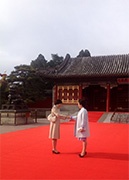
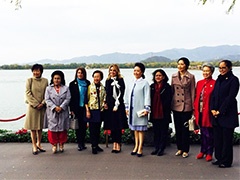
Mrs. Akie Abe participated in the APEC Leaders' spouse programme to visit the Summer Palace in Beijing. Mrs. Abe was welcomed by Mrs. Peng Liyuan, the spouse of the President of the People's Republic of China, and enjoyed a tour of the Summer Palace with other leaders' spouses. Mrs. Peng Liyuan guided the spouses to a boat tour to Kunming Lake, theatrical performances at the Dehe Garden, cable car tour and dancing performances.
Subsequently, Mrs. Abe attended the lunch hosted by Mrs. Peng Liyuan at the Aman Hotel. Mrs. Peng Liyuan made a welcome speech, followed by discussion among the leaders' spouses.
(2) Visit to the Beijing Center for Japanese Studies
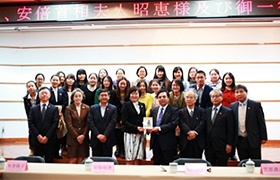
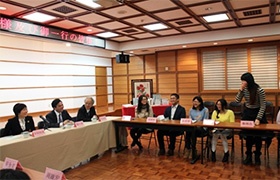
Mrs. Akie Abe visited the Beijing Center for Japanese Studies in the afternoon. The center was established succeeding the "Training Center for Japanese Language Teachers," commonly called "Ohira School". Now the center is the hub of Japanese studies in China and plays an important role in training academics and development of that field.
Mrs. Abe was welcomed by principal members of the center and donated "Akie Book Collection" to the institute. Mrs. Abe had a discussion with their students after that. The youngsters presented their research to Mrs. Abe and asked her various questions such as her impression on China (how it changed since her last official visit), her life style, and fashion. Mrs. Abe said "Through cooperation between Chinese and Japanese women, we would like to build a society where women shine,".
[Note] 1 JET Programme
JET stands for Japan Exchange and Teaching Programme. This program is operated through a partnership between the Ministries of Japan[Note] and local governments, and invites young people around the world to provide them opportunities to teach languages, sports, etc., in junior-high and high schools in Japan, and to work in local governments in order to promote international exchange in local communities.
[Note] 2 Akie Book Collection
Mrs. Abe, with the cooperation of relevant organizations, donates Japan-related books and Japanese language teaching materials to educational institutions and other entities that hold Japanese language and Japanese culture classes in the countries she visits, in the hope that they will prove useful in encouraging further exchanges and the dissemination of Japanese language learning and Japanese culture in those countries.

